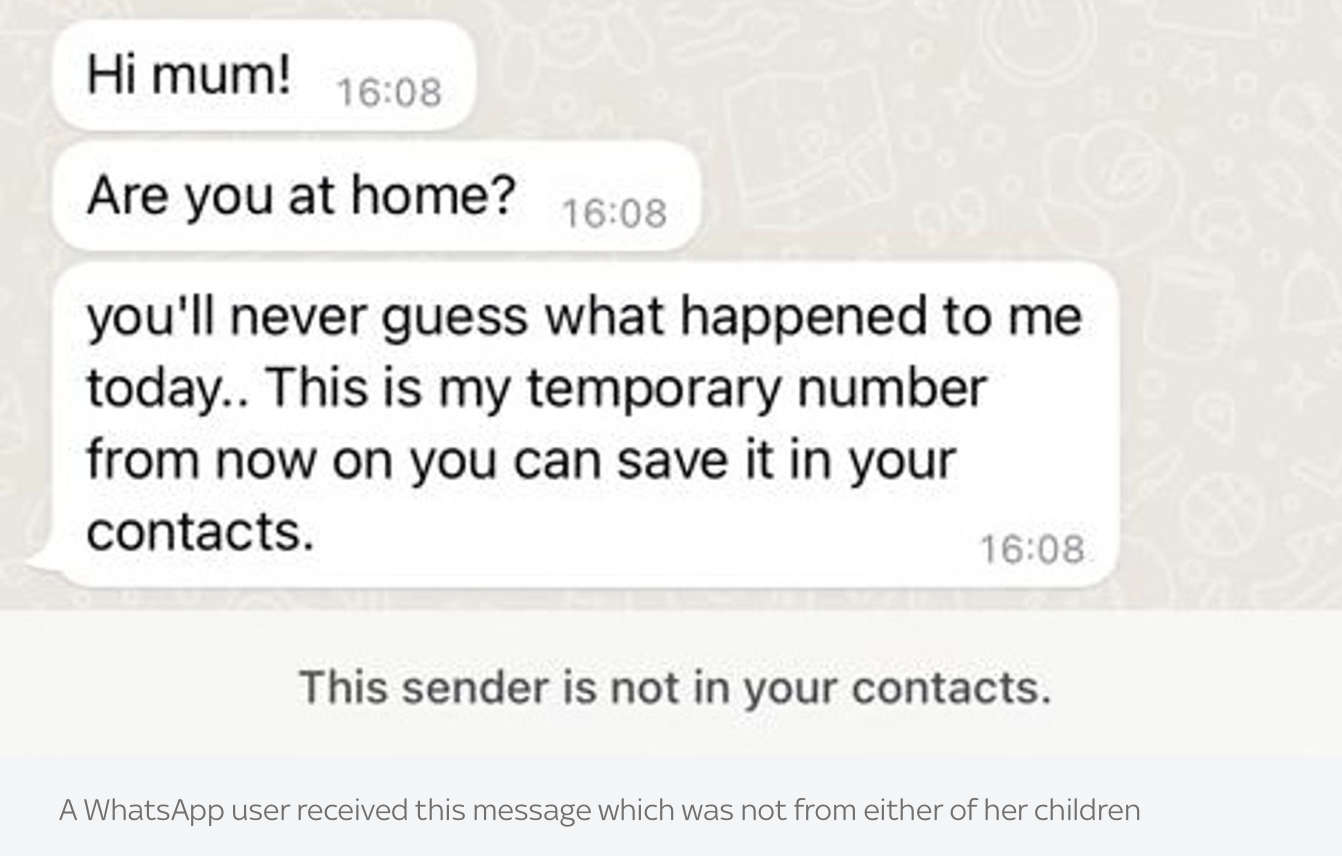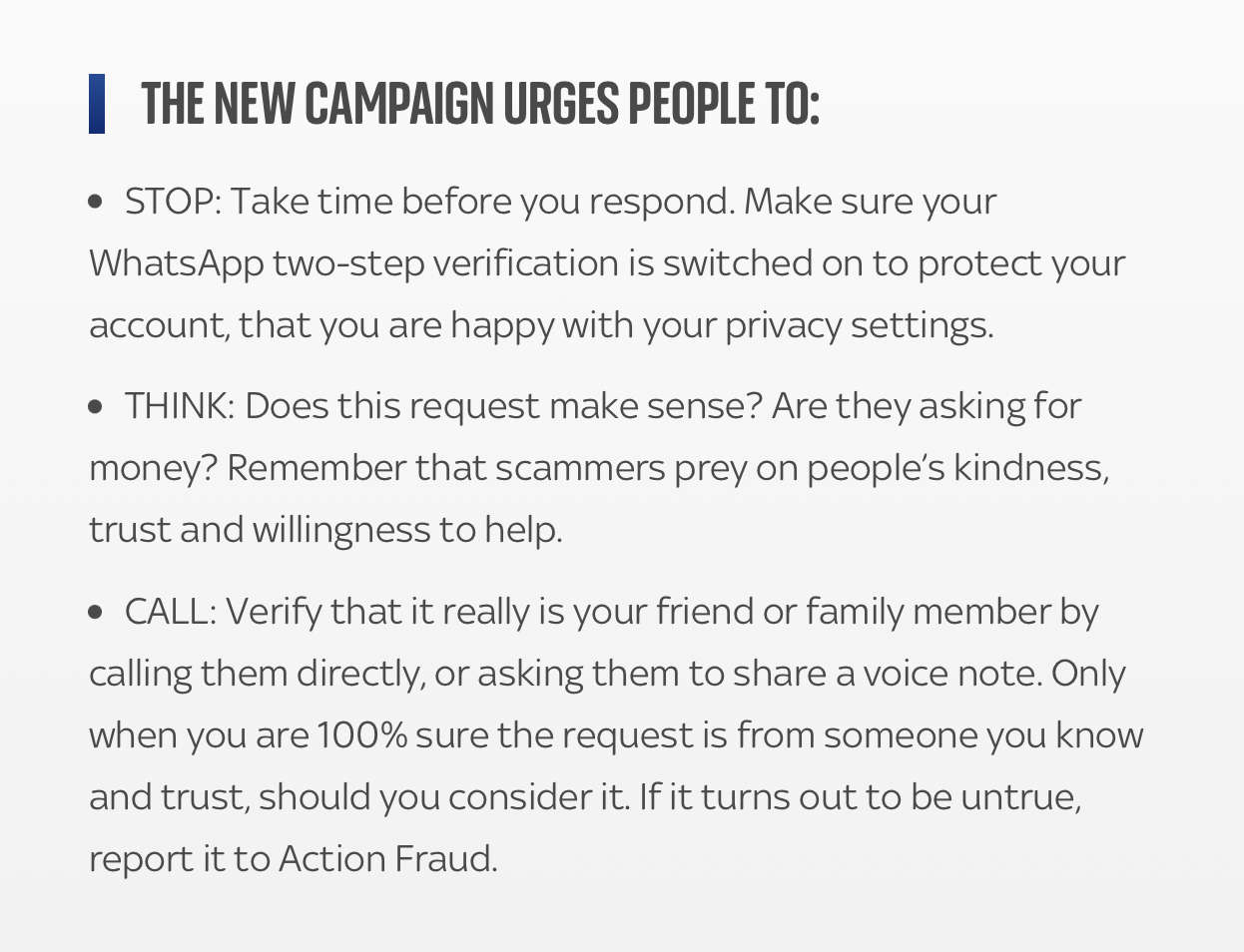
People are being urged to be wary of WhatsApp messages and texts from friends they know claiming to be in need.
A new awareness campaign launched by WhatsApp and National Trading Standards says that 59% of people have either received a scam text in the last year or know someone who has.
The Stop. Think. Call. campaign aims to inform potential victims about the scams and educate them on how to protect themselves and their WhatsApp accounts.
Scammers can hijack WhatsApp accounts, often by using accounts they have already hijacked, to message friends and contacts asking for help.
Often these "friends in need" claim that they are sending their WhatsApp security code to the victim and ask for it to be send back to them - however this security code belongs to the victim and enables the criminals to hijack their account.
Other scammers ask directly for money or personal information to be shared over the app.

Louise Baxter, the head of the National Trading Standards scams team and Friends Against Scams, said reports of "friend-in-need" scams have been growing in recent months.
Ms Baxter said:
"Scammers send messages that appear to come from a friend or family member asking for personal information, money or a six-digit pin number.
"The messages are sent from the compromised accounts of your friends, so they look as if they’re coming from someone you know, or from an unknown number claiming to be a friend who has lost their phone or been 'locked out' of their account.
"These kinds of scams are particularly cruel as they prey on our kindness and desire to help friends and family."
Kathryn Harnett, policy manager at WhatsApp, said:
"WhatsApp protects our users' personal messages with end-to-end encryption, but we want to remind people that we all have a role to play in keeping our accounts safe by remaining vigilant to the threat of scammers.
"We advise all users never to share their six-digit pin code with others, not even friends or family, and recommend that all users set up two-step verification for added security.
"If you receive a suspicious message (even if you think you know who it is from), calling or requesting a voice note is the fastest and simplest way to check someone is who they say they are. A friend in need is a friend worth calling."
The campaign has also recruited MPs, senior officials and others as "scambassadors" to attempt to raise the profile of the issue on a national level.
Scambassador Joel Dommett said:
"Simply remembering to Stop. Think. Call. when you get an unusual message may save you a lot of money and inconvenience in the long run."



 Brighton: A23 Improvement Work To Begin In June
Brighton: A23 Improvement Work To Begin In June
 New Ancient Trade Exhibition To Open At The Beachy Head Story
New Ancient Trade Exhibition To Open At The Beachy Head Story
 Sussex Beaches Win Big In Annual Awards
Sussex Beaches Win Big In Annual Awards
 Police Still Searching For Two Men Over Hastings Fatal Hit-And-Run
Police Still Searching For Two Men Over Hastings Fatal Hit-And-Run
 Pulborough Rapist Has Jail Sentence Extended After Appeal
Pulborough Rapist Has Jail Sentence Extended After Appeal
 Planners Approve Battery Storage Facility In Hooe
Planners Approve Battery Storage Facility In Hooe
 Children’s Charity Launches Campaign To Provide Wellbeing Service at Brighton Hospital.
Children’s Charity Launches Campaign To Provide Wellbeing Service at Brighton Hospital.
 Sussex Air Ambulance Charity Raises £1m To Buy Its Helicopter
Sussex Air Ambulance Charity Raises £1m To Buy Its Helicopter
 New Southern Timetable To Add 5,000 South Coast Seats From Next Month
New Southern Timetable To Add 5,000 South Coast Seats From Next Month
 New Mayor A Leader For ‘Unity And Progress In Brighton & Hove’
New Mayor A Leader For ‘Unity And Progress In Brighton & Hove’